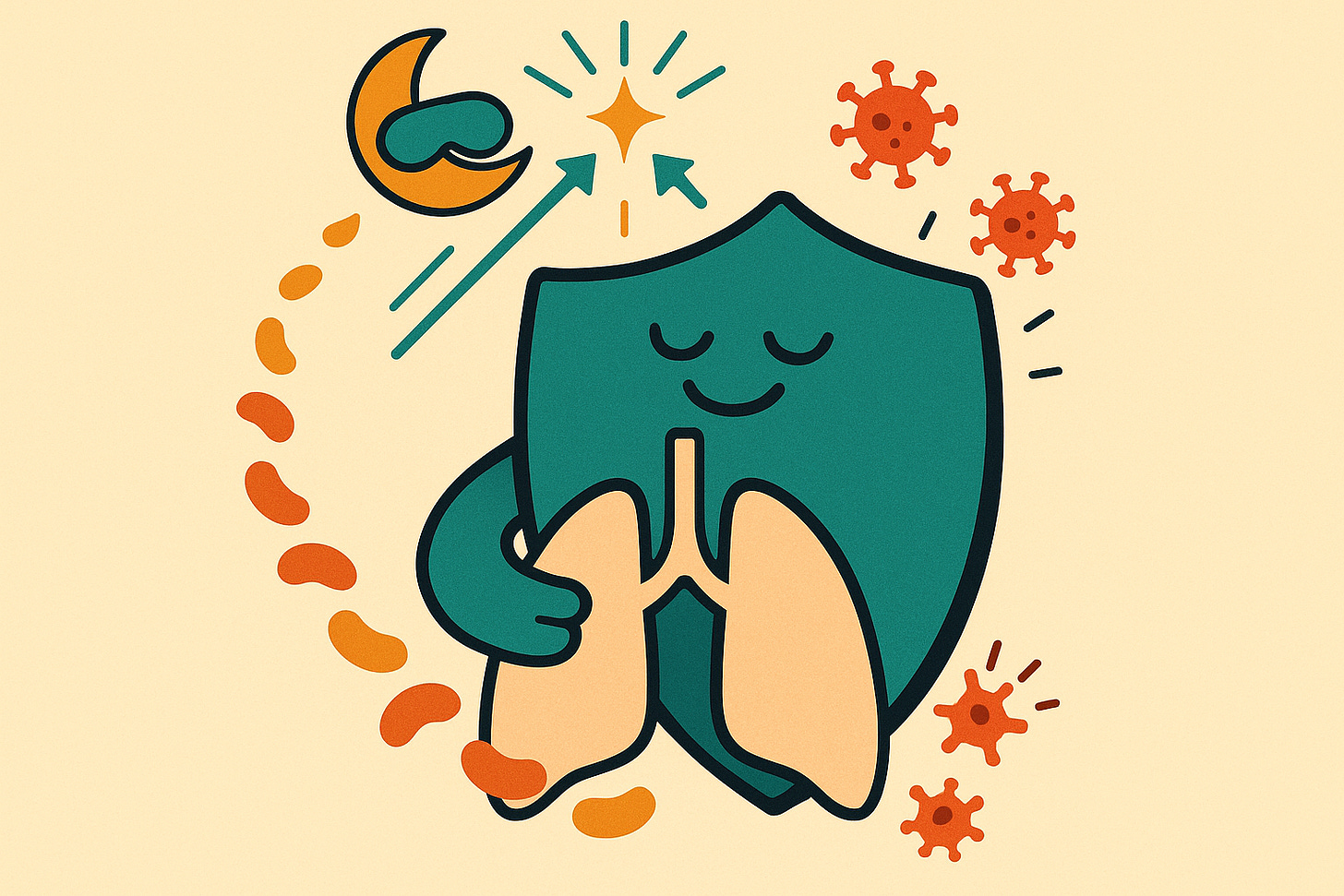Tryptophan's Hidden COVID Defense: How One Amino Acid Could Shield Your Immune System
The overlooked nutrient that might help your body fight viral infections better
I started taking tryptophan a few days ago on a whim to see what it'd do for my sleep—then got exposed to COVID and stumbled across research suggesting this timing might've been accidentally brilliant. The finding is that tryptophan, the amino acid everyone blames for post-turkey drowsiness, could actually strengthen our immune defenses against COVID-19.
International researchers just revealed that the virus disrupts how our bodies process this essential nutrient, which might explain why some people get hit harder than others.
"Tryptophan and its metabolites including melatonin have the capacity to improve the immune system and reduce inflammation in various conditions... increasing evidence from several studies show that tryptophan and its metabolites including melatonin can reduce inflammatory reactions and enhance the immune system."
What's the Big Idea?
The study is a wake-up call about tryptophan's potential role in COVID-19 defense mechanisms. Scientists discovered that COVID patients show major changes in their tryptophan metabolism—basically, the virus seems to mess with how our bodies process this crucial amino acid.
Here's where it gets interesting: they found that inflammatory networks go haywire in COVID patients, with genes involved in tryptophan metabolism working overtime. The connection? Interleukin-6 (IL-6), a key player in COVID's inflammatory storm, directly affects how our bodies handle tryptophan. When I read this, it clicked—maybe that's why some people sail through COVID while others struggle. Could tryptophan levels be part of the puzzle?
Why Should You Care?
The implications are pretty straightforward for anyone thinking about immune health. Your body uses tryptophan to make serotonin (that "feel-good" chemical) and melatonin (your sleep hormone), both of which pack serious immune-boosting power. COVID appears to hijack this system, potentially leaving you more vulnerable. Think about it—if the virus disrupts tryptophan metabolism, wouldn't supporting that system make sense?
The research suggests that maintaining healthy tryptophan levels through diet or supplementation could help your immune system stay robust. Plus, there's the mental health angle: stress from the pandemic might deplete serotonin, creating a vicious cycle where you're both anxious and immunologically weaker. After starting tryptophan myself, I noticed better sleep within two nights—and good sleep is crucial for immune function.
What's Next on the Horizon?
The future research directions are where things get really intriguing. Scientists need to run actual clinical trials testing tryptophan supplementation in COVID patients—right now, we're working with compelling biological mechanisms but limited human data. Who knows, maybe soon we'll see personalized nutrition protocols that measure your tryptophan metabolism to predict COVID severity.
There's also the question of optimal dosing and timing. Should you take tryptophan preventatively? During infection? The paper hints at using tryptophan metabolites as biomarkers for COVID progression. Honestly, I'm curious whether combining tryptophan with other immune-supporting nutrients might create synergistic effects—that's something nobody's studied yet.
Safety, Ethics, and Caveats
The limitations are worth noting before anyone rushes to the supplement aisle. This paper is essentially a hypothesis piece—it's connecting dots between existing research rather than presenting new clinical trials. The authors themselves admit the evidence is "circumstantial" and needs experimental validation. There's also the dosing question: too much tryptophan can cause its own problems, like nausea or serotonin syndrome if you're on certain medications.
What struck me is that we don't know if supplementing tryptophan during active COVID infection is beneficial or if the virus might somehow exploit it. The ethical concern? People might delay proven treatments while experimenting with supplements. Still, given tryptophan's long safety record when used appropriately, it seems like a reasonable addition to—not replacement for—standard care.
What This Could Mean for You
The practical takeaway is that supporting your tryptophan pathways might be a smart defensive move. You could increase tryptophan-rich foods like turkey, eggs, cheese, salmon, nuts, and seeds—basically, a Mediterranean-style diet hits many of these naturally.
If you're considering supplements, typical doses range from 500mg to 2g daily, though you'd want to start low and see how you respond. I've been taking 1g before bed, and besides the sleep improvement, I feel more mentally resilient—though that's just my experience.
Consider timing too: taking tryptophan on an empty stomach or with carbs (but not protein) helps absorption. Most importantly, don't treat this as a COVID cure—think of it more like wearing a seatbelt... it's not going to prevent all accidents, but it might reduce the damage if something happens.


